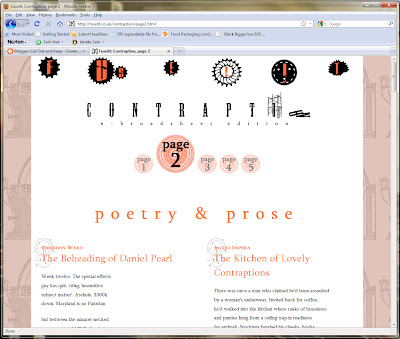Yesterday morning, countless small poetry organisations found out their arts council funding had been removed entirely, while many larger, more lucrative establishments awoke to a fully replenished pot. Faber, this country's financially dominent poetry publisher, with a rather healthy line in middlebrow fiction, were awarded
£160,000 of public money, despite their investment in new poets being far too little, far too late (eight pricey pamphlets over the last two to three years, none of which were permitted a title). A thus far mild recession has been used as the cover for an ideological attack on the arts by a government committed to the interests of big business and rather gamely hoping that the rest of civilisation will sort itself out.
In terms of the process behind these developments, the arts council has characterised its actions as a series of "tough decisions". Actually, their tack seems rather straightforward. The smaller, more socially progressive, less publicly visible organisations have been dumped, while those with a claim to being big stonking cultural institutions have largely escaped unharmed. It's a conservative redistribution of funds for a Conservative government.
On reading some of the justifiably outraged responses to this situation, however, there's a faint whiff of entitlement that undermines the case against this savagery.
This piece in the Evening Standard bemoans the arts council's predisposition to favour poorer, more ethnically diverse areas, where, one might imagine, the money is most needed and the results easiest to ignore by an artistic establishment still in thrall to the image of the fiercely intellectual, explosively bigoted, white, male pensmith:
"So, let's get this right, I said. If I took over an old theatre east of London and put on a play about the slave trade starring West Indian actors... She interrupted: 'You'd get more money than you'd need.'
An organisation that is supposed to finance the arts sees itself as having some higher, missionary purpose, reaching out into places where there is little cultural life. No matter that the people who live there may not want it or that in pursuit of their sociopolitical endeavour they ignore artistic excellence."
Artistic excellence, eh? I wonder who gets to decide what fulfils that criteria, and according to
what model.
Meanwhile, in
today's Independent viewspaper, ACE is rightly taken to task for cutting the funding to the Poetry Book Society. But despite having an obviously rightous case to make, John Walsh can't resist tossing out some suspicious-looking assertions:
"For nearly 60 years, the PBS's distinguished judges (Philip Larkin was chairman in the 1980s) have steered the nation's poetry-lovers towards the best stuff around ... The Poetry Book Society has for 57 years kept us up to speed about our finest home-grown poets, and rewarded them every year."
If there's one thing you don't do when rallying to an organisation's cause, it's inadvertently point out its failings. One of the PBS's main problems in recent years has been its stylistically stilted tastes and failure to embrace the fuller range of British poetry. This holds true for both its book club recommendations and the TS Eliot shortlist, which has cycled through many of the same big names whilst entirely ignoring the majority of publishers. The idea of a list which doesn't feature at least two or three Faber books, the rest being made up chiefly of Carcanet, Bloodaxe and Picador, apparently doesn't bear thinking about. After all, these presses stand for 'artistic excellence', to the point where one genuinely doubts that all or even most poetry books published every year in this country are so much as glanced at by those elected to pick the 'best'.
This may even have been a concern of ACE in arriving at their decision. An extremely pissed off
George Szirtes insinuated as such in
his blog post on the subject:
"The Arts Council sent out an observer who could not have done a better of job of stabbing the organisation in the back if she had been paid to do it. Her report was grudgingly complimentary but noted that she would not have had quite that shortlist ..."
Then he tellingly adds:
"... (as if it was any business of hers to comment on it, ignoring the fact that there were two Nobel Prize winners on same list) ..."
Ah! Naturally, the shortlist can't be questioned if it has Nobel Prize winners in it, certainly not by someone who Szirtes "wouldn't particularly trust to make any judgment on poetry".
Who would he trust to make judgements on poetry? Perhaps someone like
Ruth Padel, the chair of the 2010 Forward Prize committee, who went on to give a glowing review of one of the shortlisted titles (
Fiona Sampson's 'Rough Music') in a mainstream paper and subsequently made a prominent appearance in
Poetry Review, which Sampson edits, all while the prize was still in play. Private Eye picked up on this and noted that "only in zany poetry world" could such blatant back-scratching go on.
Perhaps someone like Szirtes himself, who has just judged the National Poetry Competition. He's objective and he knows about poetry, right? Well, after putting the following point to him in response to this point on his blog -
"Actually, I think this is exactly the sort of area they should be sticking their noses in. Not to find an excuse to cut funding, which is the way they seem to have played it, but to introduce some kind of accountability to the process. Really, though, a comment along the lines of "I would have picked different" is piss-poor - I mean something more like a rigorous assessment of the diversity of the shortlist over a number of years, particularly in terms of publishers, women and minority groups. Sadly, I think they could well have made a case for the actual prize-giving being tunnel-visioned and conservative, and published their findings."
- I more-or-less immediately received the following pair of responses:
"I was about to type something rude here for you, Jon. Please don't bother coming here again. From now on I shall be deleting your snide little comments."
"You have a bloody nerve to talk about accountability! You certainly know how to pick your language! Would you like to make a charge of unaccountability or improper conduct now in public?"
Now, the National Poetry Prize is supposedly judged anonymously, and I was highly commended in it last year. But all of a sudden, I feel very, very much like I picked the right year. What are the chances, honestly, of a judging panel with Szirtes on it ever considering anything by me for a prize again? You can call this crazy paranoia, if you wish - I've heard enough now from other people's experiences with Szirtes to consider this view a reasonable one. (
edit: Just to make clear, I'm not suggesting here that I've heard any inside info hinting that Szirtes has been a corrupt judge - just tales of other people's personal experiences in dealing with him, the underlying point being: if this is how he reacts to confrontation, why is he inherently likely to be a more objective, even-handed judge than the ACE officer whom he feels has no business commenting on the merits of certain poetry?)
Of course, it's this threat that hangs in the air and dissuades younger or newer poets from being forthright about serious problems of credibility within the poetry world. How easy is it to have your name repeated in higher circles (those likely to find themselves recipients and judges of prizes) as one of those trouble-makers who is best entirely ignored, for the sake of maintaining the standard of 'artistic excellence'?
All of which is to come to this point: the cuts are abrupt and highly damaging, but some accountability has to be called for. That arts organisations are run in such a way as to continually depend on public money is regrettable, though in some cases, one has to concede, unavoidable. But whilst the removal of funding from the Poetry Book Society is a terrible thing, the threat of the removal of funding should have been there from the beginning in the case of any organisation that couldn't adequately demonstrate a serious commitment to that "higher, missionary purpose" so off-putting to the Standard's correspondent. At its lowest, that higher purpose should be impartiality, a test which so many poet-judges seem to mistake for having a fixed and narrow idea of what "artistic excellence" should look like. Instead of accusers being put to proof ("Show us the minutes of the clandestine meetings then! Go on!"), the burden should be on the other side to show the effort that has gone into reaching beyond personal tastes and concentric circles of acquaintances.
Making this a central criterium of funding - and transparently so - would have been hugely preferable to the razing of the least visible organisations. In poetry's case, that might mean someone occasionally saying, "This book did absolutely nothing for me, but I have to admit that it was extremely well written." Can you imagine a poet saying that? I genuinely wonder, based on the general standard of rhetoric in criticism, articles and judge's reports, how many are even capable of envisaging such a concept, since instead the general standard of judgment seems to be personal emotional response.
And yet I would say that editors like Neil Astley and Chris Hamilton-Emery do place an emphasis on inclusivity that whould fulfil such a criteria. In Bloodaxe's case, they fully deserve their relatively small amount of funding (Neil Astley once gave a very full and generous response on this blog to my suggestion that the money would be better off elsewhere), although staking their survival on its continuance is, I feel, a dangerous game. If we have to accept the situation we've been forced into by a government with sinister and wrong-headed priorities, then an infinitely better scenario would have been putting the various arts instituions on notice and giving them a chance to prepare for a world without funding. I suspect that many who think they can't survive without it could, given sufficient warning and an adequate reason, find a way to go on. At the same time, making them fight to be recognised as the most progressive and open-minded, as opposed to the most pompous and jewel-encrusted, can only be a good thing.
Oh, and for what it's worth, George Szirtes' 'Reel', which won the 2004 TS Eliot prize, is an excellent book, which I highly recommend.













